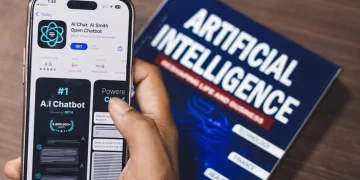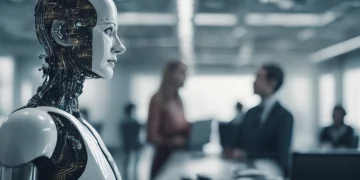The future of Artificial Intelligence (AI) is envisioned to be transformative, bestowing efficiency gains across diverse sectors. It is expected to revolutionize job roles, enhance healthcare outcomes and highlight distinct ethical and regulatory issues. Particular developments include automation within industries, optimised care delivery in healthcare, and novel challenges surrounding data security and privacy. AI’s projected acceleration in job displacement underscores the importance of upskilling initiatives.
Main Points
- AI is predicted to infiltrate automotive industry, with AI-driven technologies anticipated to be incorporated in 109% of vehicles by 2025.
- Healthcare will continue to benefit from AI, advancing in areas like monitoring, diagnostics, and personalized medication.
- Automation of routine processes will allow the human workforce to focus more on creative and empathetic tasks.
- AI is expected to revolutionize sectors like transportation and healthcare, driving ongoing transformation with its innovative technologies.
- Balancing AI’s environmental impact with its potential to mitigate climate change effects through efficient supply chains and sustainable technologies is a future challenge.
Understanding Artificial Intelligence Evolution
The evolution of Artificial Intelligence (AI), it is evident that advancements since the 1950s, particularly in machine learning and deep learning, have revolutionized its capabilities and applications, resulting in a broad integration across approximately 55% of organizations worldwide.
The trajectory of AI’s progression is remarkable, with milestone events such as IBM’s Deep Blue defeating chess grandmaster Garry Kasparov in 1997, which served as a confirmation of the potential of AI. This era observed the power of AI in strategic problem-solving, paving the way for more sophisticated applications.
The advent of OpenAI’s GPT models in 2018 marked a significant leap forward in language processing capabilities. Subsequent models, including GPT-4 and ChatGPT, have further pushed the boundaries of AI, demonstrating its potential to imitate human-like conversation and comprehension.
AI’s diverse applications, from sequencing RNA for vaccines to modeling human speech, underscore its transformative role across various domains. The breadth and depth of these applications underscore the versatility of AI technologies, fueling their widespread adoption.
In essence, understanding the evolution of AI, with its advancements in machine learning, deep learning, and GPT models, is critical to appreciate its current applications and anticipate its future trajectory.
AI Anticipated Impacts
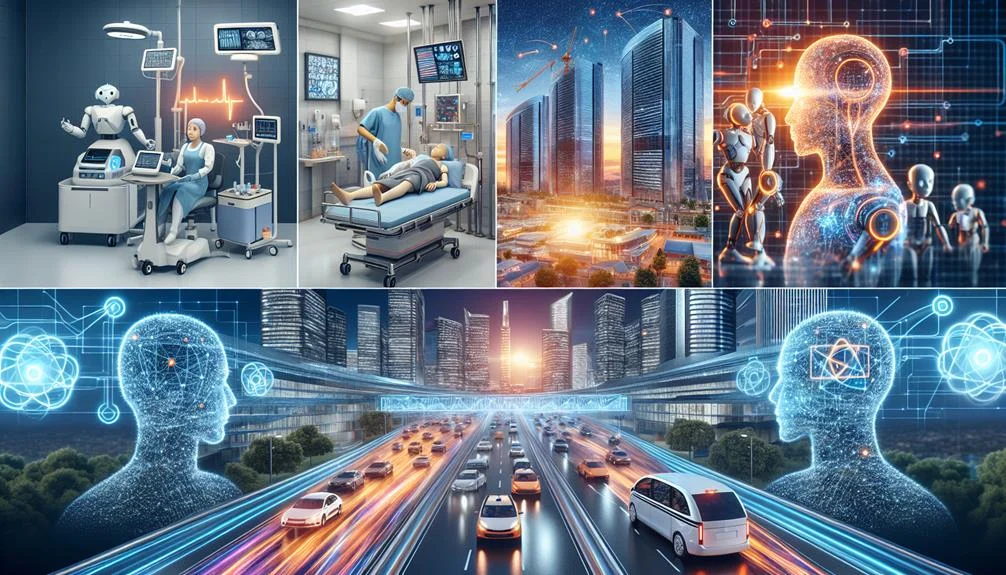
Having traced the remarkable journey of AI evolution, it is equally important to explore its anticipated impacts, which are projected to be transformative across a myriad of sectors. The future of AI is believed to revolutionize industries, creating novel job opportunities and redefining existing roles. A profound AI impact can be witnessed in the healthcare industry, where AI systems are expected to enhance healthcare outcomes, improve patient care, and accelerate drug discovery processes.
Similarly, businesses are utilizing these emerging technologies, specifically generative AI applications, for tailored content creation, enhancing efficiency, and realizing cost savings. The anticipated AI impacts are not just limited to automation and productivity gains; they are also expected to drive innovative solutions across different sectors.
In the future, the collaboration between humans and AI will navigate the work environments. This partnership is essential to harnessing the full potential of AI systems. It is evident that the future impact of AI will be far-reaching and transformative, permeating almost every aspect of our lives and industries. As AI continues to evolve, so too will its impacts, underscoring the importance of keeping pace with this powerful technology.
Artificial Intelligence in Diverse Industries
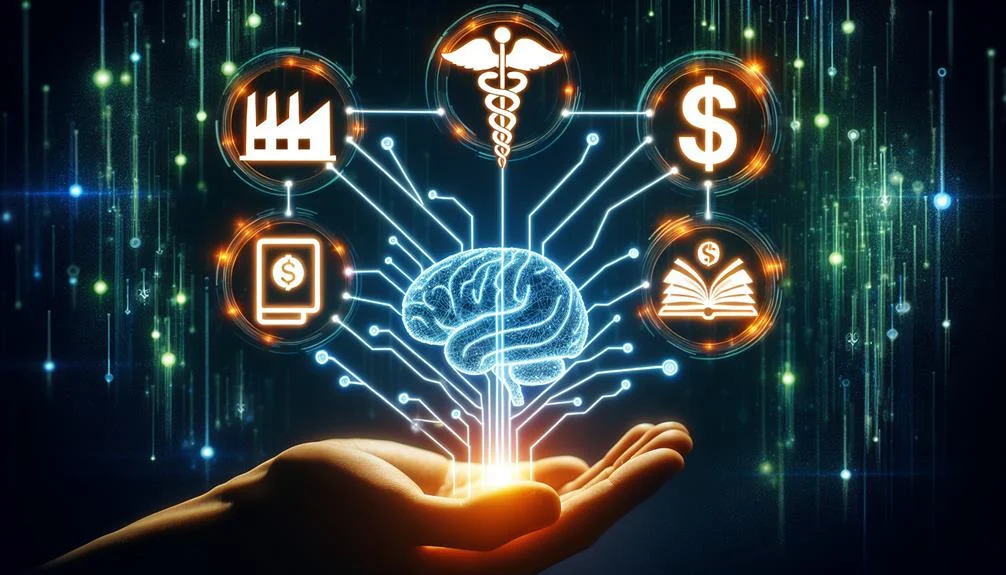
The impact of artificial intelligence (AI) has been pervasive and transformative across a range of sectors, particularly within healthcare and agriculture.
The advent of AI in healthcare has ushered in a revolution, improving diagnostic accuracy, reducing clinician workload, and enhancing patient care.
Simultaneously, the agricultural sector is undergoing a significant shift, with AI driving improvements in crop yield, resource management, and sustainable farming practices.
Healthcares AI Revolution
Propelling a revolution in healthcare, Artificial Intelligence is dramatically improving patient care through advancements in diagnostics and the creation of personalized treatment plans. The healthcare industry is experiencing significant transformations, with AI in healthcare enabling more effective and personalized interventions. These advancements have been made possible due to the integration of AI technologies that provide superior diagnostic support, leading to enhanced patient outcomes.
The following table encapsulates the key areas of AI application in healthcare:
| Area of Application | Impact of AI |
|---|---|
| Monitoring and Disease Detection | AI aids in precise monitoring, early detection, and accurate diagnosis of diseases. |
| Treatment Strategies | AI facilitates the creation of personalized treatment plans, optimizing patient care. |
| Clinician Workload | AI-driven technologies reduce clinician workload, allowing for more focused patient care. |
The Future of Artificial Intelligence in Agriculture
In agriculture, the integration of Artificial Intelligence has become a transformative force, optimizing crop management, irrigation, and pest control for elevated efficiency and higher yields. This transformation is largely driven by the convergence of data and Intelligence, creating what’s known as precision agriculture.
Here, vast amounts of data, collected from various sources, are analyzed through machine learning — a subset of AI — to provide insightful, actionable information. By integrating human learning with predictive modeling, farmers can anticipate crop diseases, adjust planting schedules, and manage resources more effectively.
This level of precision and predictability, hitherto unattainable, is revolutionizing agriculture, paving the way for sustainable farming practices and improved food production.
The Dark Side of Artificial Intelligence
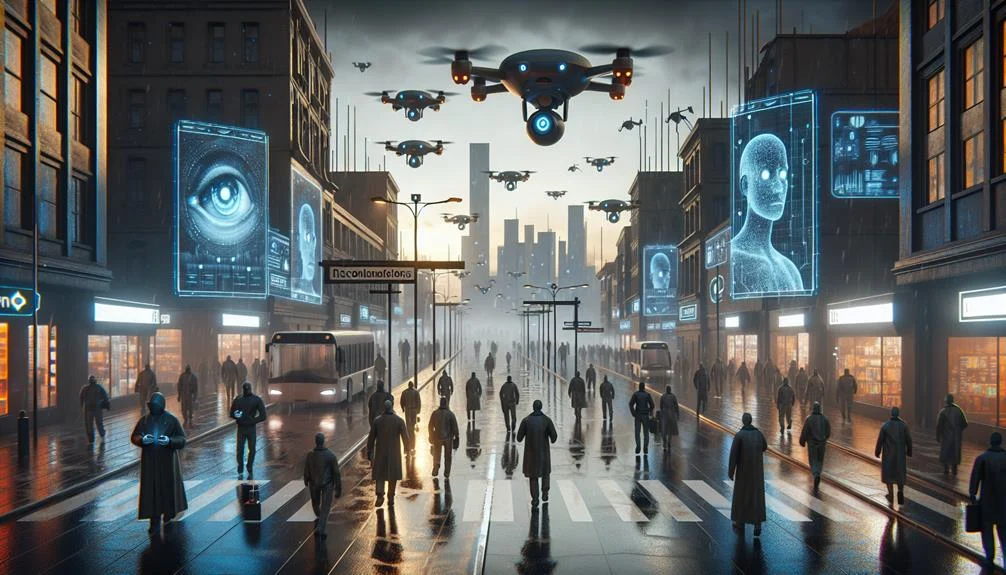
Despite the immense potential of artificial intelligence in revolutionizing sectors such as healthcare and manufacturing, its darker aspects, including the risk of misinformation through deepfakes, ethical concerns over automated weaponry, potential privacy breaches, and possible job displacement, pose significant challenges to society. AI’s capabilities, while impressive, introduce an array of privacy concerns. Data privacy breaches can occur when AI models are trained on public and private data, potentially leading to unauthorized access to sensitive information.
AI’s potential to propagate misinformation through deepfakes is another troubling aspect. These artificially generated videos blur the line between reality and fiction, making it difficult to distinguish truth from falsehood. The ethical concerns associated with AI are equally pressing, particularly in relation to automated weaponry. Without proper regulations, these weapons can cause unintended civilian casualties.
The following table summarizes these challenges:
| Challenge | Description | Mitigation |
|---|---|---|
| Misinformation | Deepfakes blur reality and fiction | Strict regulations and technology to detect deepfakes |
| Privacy Breaches | Unauthorized access to sensitive data | Robust data security measures |
| Job Displacement | AI disruptions may affect workers | Re-skilling and up-skilling initiatives |
| Ethical Concerns | Misuse of automated weaponry | International treaties and ethical guidelines |
Future Artificial Intelligence developments must balance potential benefits with these darker aspects to guarantee broad societal acceptance.
Future of Artificial Intelligence and Job Market Shifts
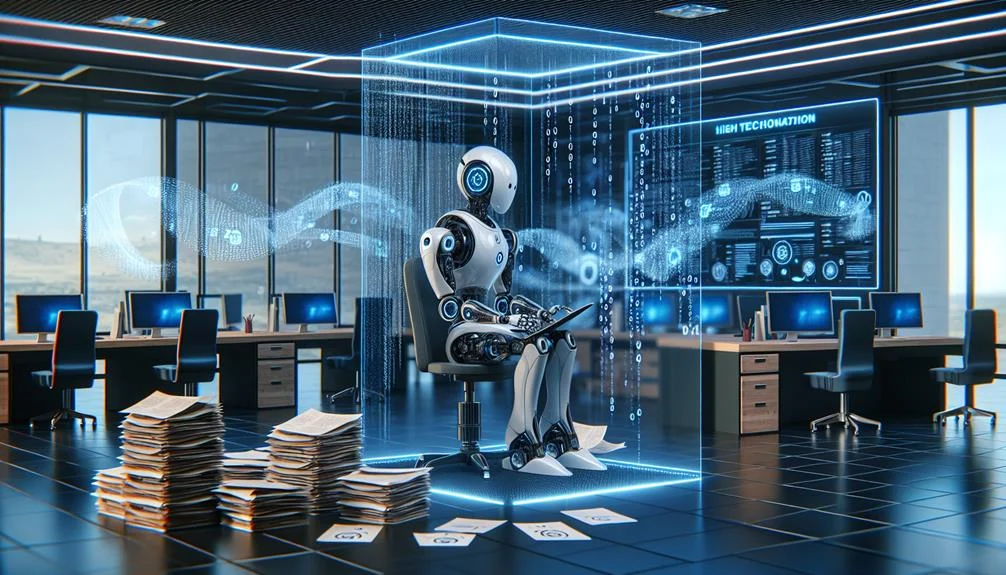
The advent of artificial intelligence has sparked a significant shift in the job market landscape, with both displacement and creation of roles. While traditional positions in areas like bookkeeping and customer service are at risk due to automation, a surge in demand for AI-related roles, such as data science and machine learning, is evident.
This evolving job market underscores the essential need for upskilling and adapting to technological progress.
AIs Impact on Employment
How is artificial intelligence influencing the employment landscape, one might ask? AI disruptions are profoundly reshaping the job market, resulting in job losses and substantial displacement in various sectors. Three key impacts stand out:
- Automation: With AI advancements, around 30% of tasks performed by employees could be automated, replacing roles in bookkeeping and customer service.
- Displacement: AI is projected to affect 44% of workers between 2023-2028, leading to displacement but also creating opportunities in data science and machine learning.
- Technical Roles: The demand for AI specialists is rising, marking a shift towards more technical roles. Positions like prompt engineers and AI trainers are emerging as AI reshapes job requirements and demands.
Thus, while AI might cause job losses, it also paves the way for new technical roles.
Future of Artificial Intelligence Job Market Predictions
As we peer into the crystal ball of future labor market trends, it becomes evident that Artificial Intelligence is set to dramatically reshape the employment landscape, with AI disruptions projected to impact 44% of workers between 2023-2028.
Concurrently, nearly half of the workforce may experience alterations in their tasks due to the rise of generative AI technologies. This disruption, however, is not solely destructive. It is paving the way for new opportunities within data science, machine learning, and software development.
The job market’s evolution necessitates upskilling and reskilling efforts, catering to the demand for AI trainers, prompt engineers, and machine managers. Consequently, the future workforce must adapt, growing alongside AI technologies to thrive in the increasingly automated job landscape.
Regulatory Challenges With Artificial Intelligence
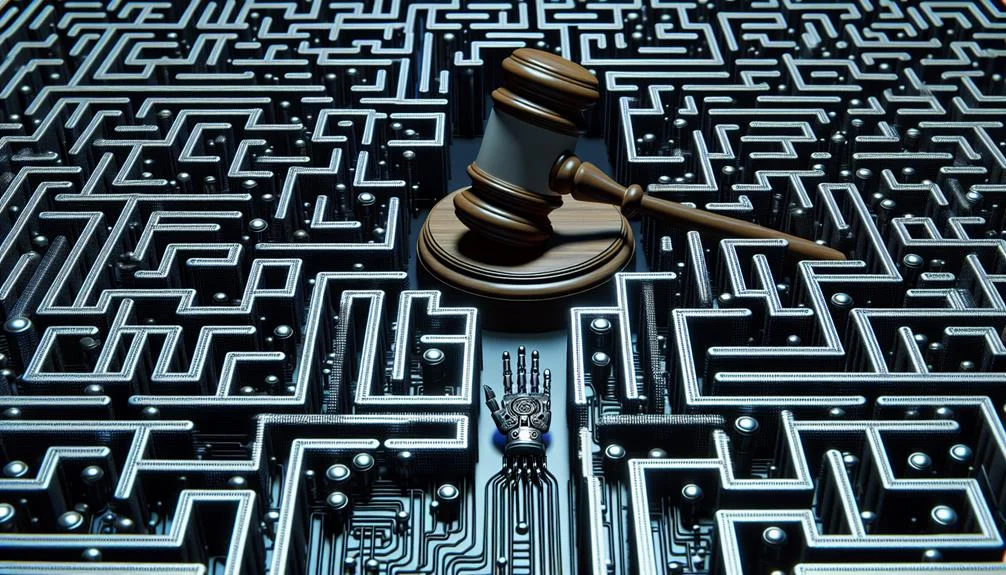
Three key aspects warrant attention:
- Data Privacy: Investigations and legislation have been initiated due to concerns about AI companies’ data collection methods, underscoring the need for stringent data privacy norms.
- Ethical AI usage: The growing demand for stronger regulations in AI usage signifies an increasing awareness about the potential misuse of AI technologies. The Federal Trade Commission’s scrutiny of data practices of companies like OpenAI exemplifies this trend.
- Intellectual Property Rights: Lawsuits against AI companies over intellectual property issues highlight the necessity for clear regulations in this sphere.
The complexities of these regulatory challenges underline the requirement for ongoing, proactive government intervention to guarantee a balanced and responsible AI-enabled future.
AIs Role in Climate Change
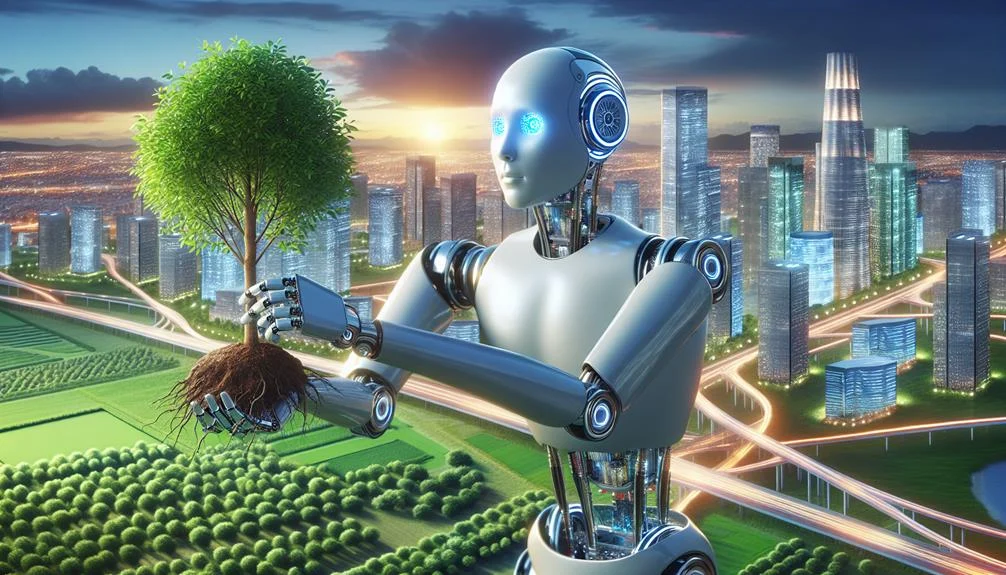
In environmental sustainability, Artificial Intelligence (AI) plays a multifaceted role in climate change, capable of both mitigating its effects through efficient supply chains and sustainable technologies, as well as potentially exacerbating it due to the high energy consumption of AI models and the environmental impact of building and training these models.
The AI-driven technologies, while offering potential solutions to global warming, also come with their own environmental concerns. The high energy consumption of AI models, for instance, could contribute to carbon emissions. Concerns also exist about the environmental repercussions of developing and training these AI models.
Below is a table summarising the key points:
| AI Impact | Environmental Concerns |
|---|---|
| Efficient supply chains | High energy consumption |
| Sustainable technologies | Carbon emissions |
| Climate-conscious technology | High cost and environmental impact |
| AI models development | Environmental impact of building and training |
| Potential solutions to global warming | Environmental impact of AI technologies |
AIs Contribution to Healthcare
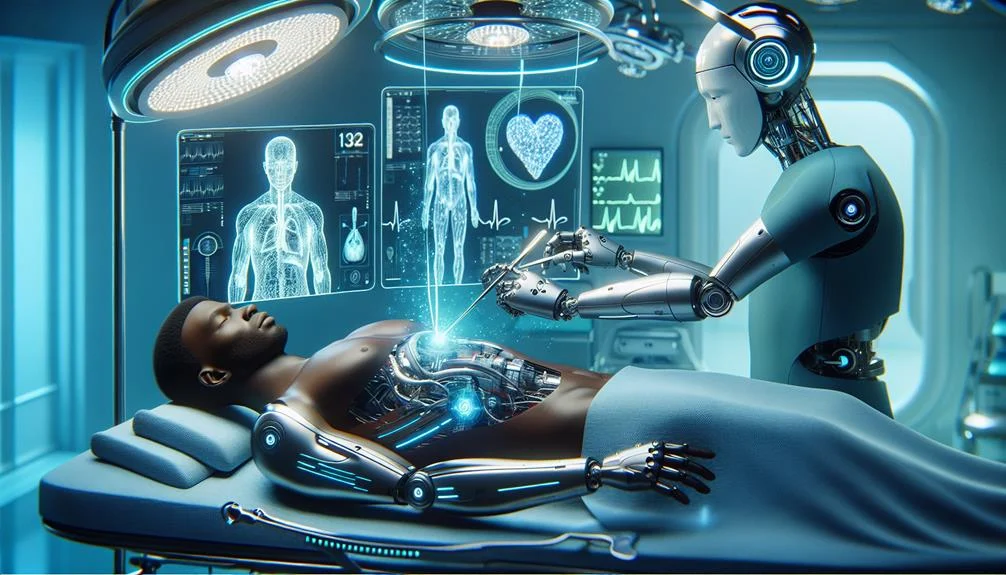
While the impact of AI on environmental sustainability is notable, it is equally transformative in the domain of healthcare, revolutionizing patient diagnosis accuracy and personalizing treatment plans. The use of AI in healthcare is a substantial stride towards improving patient care quality and optimizing operations.
Specifically, the application of AI in healthcare results in the following:
- Personalized Medicine: AI systems can analyze a patient’s medical history to create personalized and effective treatment plans, improving the overall patient experience and outcomes.
- Medical Image Analysis: Advanced AI applications can interpret medical images, such as X-rays, MRIs, and CT scans, with a level of precision and speed that surpasses human ability, increasing the accuracy of diagnoses.
- Predictive Analytics: AI enables healthcare professionals to predict patient outcomes by analyzing patterns in patient data. This allows for early intervention and more effective management of chronic diseases.
The advancements in AI applications are contributing significantly to the healthcare industry, providing a promising future for both healthcare providers and patients. AI is an indispensable tool in the modern healthcare landscape, driving innovation and enhancing patient care.
Trends in Artificial Intelligence
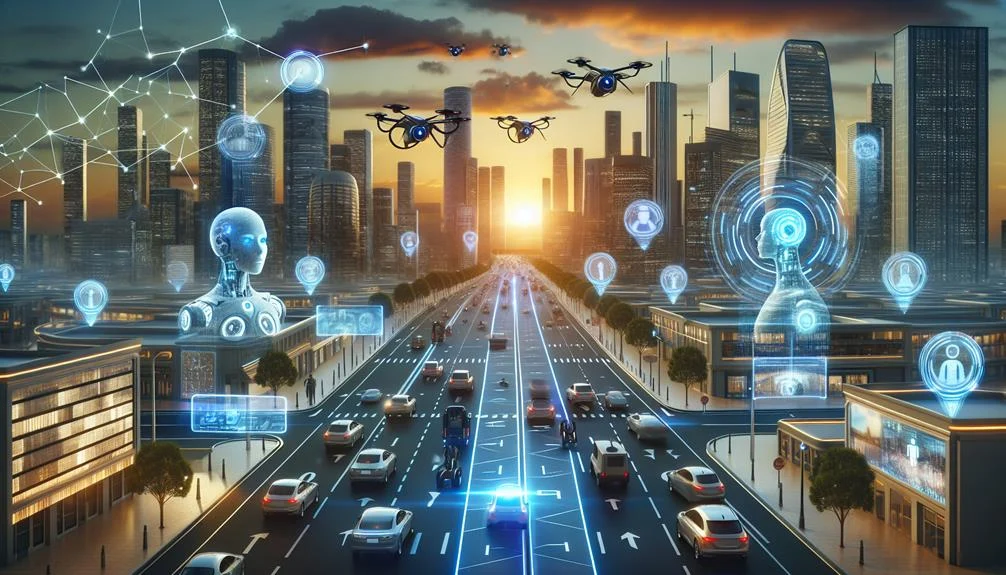
The future of AI technology holds a variety of transformative trends, poised to reshape sectors from transportation to healthcare with increased automation, precision, and efficiency.
In the healthcare sector, AI is set to facilitate significant advancements. From improved monitoring and diagnostics to personalized medication regimens, these upcoming trends in AI technology promise to enhance both the quality and efficiency of healthcare services.
| Sector | Future Trends | Impact |
|---|---|---|
| Transportation | Autonomous vehicles, Connected cars | Predictive maintenance, Best-fit routing |
| Healthcare | AI-driven diagnostics, Personalized medication | Enhanced monitoring, Improved patient care |
This projected evolution of AI-driven technologies showcases the potential of AI to automate routine processes, allowing the human workforce to focus on creative and empathetic tasks, and underscores the profound ongoing transformation in sectors such as transportation and healthcare.
Conclusion
To sum up, the future of AI is laden with potential and uncertainty. Its impact will permeate diverse sectors, from healthcare to climate change.
Undeniably, AI will instigate job market shifts and pose regulatory challenges. However, if navigated strategically, it could pave the way for unprecedented advancements.
As AI continues to evolve, society must tread carefully, ensuring its growth is harnessed for the greater good, mitigating any negative repercussions.



